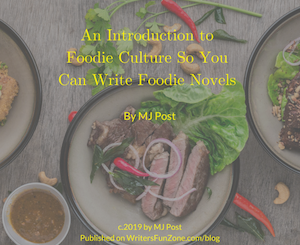Why Write a Food Novel? by MJ Post
 Let’s welcome back monthly columnist MJ Post as she shares with us “Why Write a Food Novel?” Enjoy!
Let’s welcome back monthly columnist MJ Post as she shares with us “Why Write a Food Novel?” Enjoy!
***
Back in the 80s when I was in college (#painfullyoldMJ), the local radio station was playing a bit with a guy pretending to be a king in a throne room. The crowd shouted, and he replied. It went like this.
Crowd: We’re hungry.
King: Of course you’re hungry. I’M hungry. We’re ALL hungry,so… LET’S EAT!
I didn’t know the source at the time, but I’ve just tracked it down to a 1972 album by Firesign Theater called Dear Friends, which you can listen to here.
“We’re all hungry, so let’s eat.”
Everyone eats
Some people just regard eating as a thing necessary to sustain life, but other people think of it as endlessly fascinating and organize their free time around the most compelling eating possible. They seek out and try new recipes, experiment with ingredients, plan multi-course meals, share food with friends and family and socialize over meals, eagerly rush to try new restaurants and new cuisines, and even plan their vacations (or staycations) around what sort of food is available at the destination (or in their area). They buy cookbooks and watch food TV. These people are called “foodies” in the popular culture. I like that term, but I also call them “gourmands,” which means “people who like to eat.”
If you like food in your personal life, you are probably more than happy to have it be a major part of your entertainment. This explains the success of food TV, which features variations upon several formulas, all of them entertaining and to some degree personality-driven. We have
- Expert chefs and cooks demonstrating how to make food. This formula started in the early days of TV and has never gone away. There are many great people doing this, but if you want to see a classic, watch Julia Child.
- People with lots of personality, and possibly cooking talent, visiting places and trying dishes in restaurants or private homes, along with insider looks at how the food is made. Guy Fieri currently owns this genre, but I prefer Andrew Zimmern. The best ever was the late Anthony Bourdain, who did a lot with place and culture as well as food.
- Cooking competitions, in which people with various levels of skill try to impress judges given a variety of difficult types of challenges. I particularly love these shows; Gordon Ramsay hosts a lot of the best ones, and other great ones are on Food Network. (Here’s a 2014 article about Food Network’s shows.
- Restaurant-based shows, usually featuring an expert creating drama by trying to fix a restaurant that isn’t doing well. The classics are Ramsay’s Kitchen Nightmares and Robert Irvine’s Restaurant Impossible.
Given the millions who participate actively in the food culture I’m talking about, it stands to reason that some will enjoy extending their interest in food into reading fiction about food and the people who enjoy it most (just as they do).
Fiction about food, right? How does this read?
“It’s so hot,” said Mike. “I wish those asparagus would just move over. I need some room. I feel like I’m roasting in here.”
“Yeah, I’m just baking here in this tray,” said Dan. “I wish I could get out of here already.”
Dan thought about wriggling out of the baking pan, but he couldn’t move because he was a meatloaf.
“I can’t move either,” said Mike, who was a spicy potato wedge. “I guess it’s ennui.”
“Shut up,” cried Marianne, who was an asparagus. A slick of melted butter lay across her stalky green-ness. “We’re trying to think cool thoughts.”
So, whadja think?
…?
Okay, maybe not. It was hard enough to be that corny for that long, so I couldn’t sustain it across a fiction. A fictional story about food is really about the people who make it, serve it, or especially eat it. Nearly all fiction is about people, so a food fiction is about food people, or it incorporates cooking and eating into its plot. Sure, it could be a short story or a poem, but most of the time, it’s going to be a novella or a novel. Let’s focus our attention on the full monti, which is food novel — because I’ve written one of those (Chef Showdown: A Romance, published June 2018, available on Kindle Unlimited if you have that, or $3.99 ebook, paperback isn’t that expensive either, please read and review). Er, um, cough, cough, where was I? #scatterbrainedMJ. Oh, yeah. Food novels.
WHY WRITE A FOOD NOVEL?
This question is the very crux of the gist of the nub of my central main idea kind of thing. What are food novels for? Why do we write them and why do we read them?
I’m writing right after lunch. I had restaurant leftovers: hearty, mildly-seasoned kabab kobideh and white and yellow long-grain rice kicked up with some powdered sumac, and I also had some mixed fruit salad I made myself from umber blackberries and plump tart red strawberries, and I’m now sipping my LaCroix cran-raspberry in the cute pink can (which doesn’t taste like cranberry or raspberry, but the can is kind of the right color at least).
Yiz want to eat now? Even a little bit?
What ideas do you have about me based on what I ate? (Don’t answer that; I’m scared!)
These two questions line up with the two main reasons for selecting the world of food as the basis for fiction.
First, reading about food makes us excited to eat, either that specific food, or whatever other food comes to mind. So it enhances the pleasure of food; it adds anticipation and imagination.
Also, how people eat tells us more about those people; to read about how individuals eat is to feel more understanding of them. Food choices line up interestingly with personality and culture. Think about whom we eat with: meals and drinks are standard means in every culture to establish new relationships and reaffirm older ones. Furthermore, think about how we behave when we eat. How do our meal and food habits indicate things like our comfort level, our connectedness to others, our manners, our social class?
A new restaurant just opened up the block. When I walk by, the smells are great, and the food on diners’ plates looks sensational, too, but I hear people yelling from deep in the bowels of the restaurant. What can that be all about? I wish I could get a look on the other side of that door and find out who is really in there and what they are all shouting about.
This invented scenario should lead us to the other two reasons we would want to read a food novel.
Today’s readers enjoy conflict tremendously, and the world of food offers all sorts of conflict. Competition and intense pressure are big in the restaurant world and all of its subsidiaries, including food TV, which I have used as the basis for Chef Showdown. There are food competitions off TV, regularly and all over the world. Restaurants and food are big business. Of course, where there’s business, there’s a story to be told.
Writing about food has definite charms; the greatest remaining that I have not more than alluded to is, of course, setting. Places where food is prepared — home kitchens, restaurants, TV studios — are fascinating places. They stimulate our senses; they are filled with amazement and potential. Those of us who don’t cook find ourselves almost transported to childhood. Following the story of a culinary professional is almost like being a little kid standing below the level of the counter watching mom or granny working, pouring, spreading, rolling, chopping, stirring, wrapping, and wondering what all that is about and what delicious thing will come into view (to smell and then taste) when the work is done.
#ohnonotliveragain #vomitvomit #vomit
Over the next few months, I’ll be talking more about things you will find helpful to know as you prepare to write to write a food novel. I’ll talk about chefs, culinary language, foodies, the broad setting of the food world, and some of the books and movies that already exist as models. I welcome suggestions about what you would like me to cover. Please feel encouraged to find me on Facebook or to email me for some chat about writing at MJPostAuthor at gmail dot com.
So, where should I wrap up? I don’t know, I’ll figure it out later. #timeforasnack.
***
ABOUT THE AUTHOR
 MJ Post (pseudonym) is a Brooklyn high school teacher and writer from Queens, NY. Educated in the South with an attitude straight out of Bensonhurst and Bay Ridge, MJ writes contemporary new adult romance and romantic comedy with a multi-regional flavor. MJ is happily married.
MJ Post (pseudonym) is a Brooklyn high school teacher and writer from Queens, NY. Educated in the South with an attitude straight out of Bensonhurst and Bay Ridge, MJ writes contemporary new adult romance and romantic comedy with a multi-regional flavor. MJ is happily married.
MJ’s work includes five romance novellas with Mysti Parker, one solo romance novel, and under her real name, five novels and two nonfiction books as well as miscellaneous other collections.
MJ’s novel Chef Showdown: A Romance, two young chefs fall in love while competing on a reality TV cooking show under the watchful eye of the toughest judge imaginable. It will make you hungry for some love and some great food.
Amazon author page: https://www.amazon.com/MJ-Post/e/B074HX7TJK/ref=sr_ntt_srch_lnk_1?qid=1540345235&sr=8-1
Readers’ group and street team: https://www.facebook.com/groups/432743907149227/
Author page: https://www.facebook.com/MJ-Post-Author-302156203319243/
Newsletter signup: http://eepurl.com/dyVqqz
Instagram: http://www.instagram.com/MJPostAuthor
Twitter: http://www.twitter.com/MJPostAuthor




